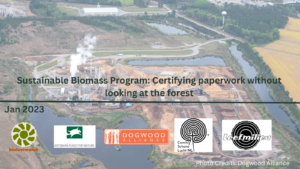 Joint report by Biofuelwatch, Comite Schone Lucht, Dogwood Alliance, and Estonian Fund for Nature en Leefmilieu
Joint report by Biofuelwatch, Comite Schone Lucht, Dogwood Alliance, and Estonian Fund for Nature en Leefmilieu
Click here to download the full report (updated May 2023)
Click here to download the report in Dutch (updated May 2023)
Executive Summary
Dutch pellet imports increased more than 8-fold between 2017 and 2020, as RWE, Uniper and Onyx ramped up biomass co-firing in their coal plants. At present, the vast majority of those pellets come from the Southeastern USA, however, significant quantities are imported from the Baltic States, too.
Wood pellet burning in large power stations is only possible because of generous renewable energy subsidies under the Dutch SDE++ programme. In order to qualify for those subsidies, the wood is supposed to meet a set of SDE++ sustainability and greenhouse gas criteria. Since late 2019, all pellets certified by the Sustainable Biomass Program (SBP) have been deemed to automatically meet those criteria.
In this briefing, we investigate whether the Dutch authorities’ decision to deem all SBP-certified wood pellets to meet national sustainability and greenhouse gas standards is justified. Our findings show that this is not the case, i.e., that the SBP does not provide credible auditing of supply chains or verification of claims made by pellet producers and that its interpretation of criteria is at odds with what is required under by the SDE++ scheme.
Given that all SBP-certified pellets can automatically be burned with SDE++ subsidies in the Netherlands, the evidence uncovered here is relevant regardless of whether pellets are indeed sourced for example from the particular US pellet mill discussed (information not made publicly available by energy companies).
Key problems with the SBP identified in this briefing are:
- Lack of external auditing of forest management linked to pellet production: it is left to pellet producers to visit and inspect forests and plantations from which pellets are sourced. Certifiers are not required to carry out such site visits;
- Lack of appropriate scrutiny of claims made by pellet producers and information sources provided by them: SCS Global uncritically accepted Enviva’s claim that clearcutting highly biodiverse hardwood forests in the Southeastern USA will not generally harm biodiversity and can be of ecological benefit – despite strong evidence to the contrary. SCS Global reproduced the weblink to the document provided by Enviva as the same source of that claim, without realising that this the document was replaced with a different one in 2016, one which highlights the adverse ecological impacts of clearcutting the forests from which Enviva is sourcing;
- Inconsistent interpretation of evidence by certifiers: The Regional Risk Assessments for Latvia and Estonia, both undertaken by Preferred by Nature, contradict each other with regards to logging impacts on forest birds: in the case of Latvia, logging is classified as a posing a risk to forest bird species; in the case of neighbouring Estonia, some of the same forest bird species are not deemed to be at risk from logging.
- SBP indicators, i.e. guidelines for interpreting criteria, are not compatible with SDE++ criteria: the SBP allows wood sourcing even if, as is the case in Estonia, intensive logging has turned forests into a net carbon source, i.e., forest carbon stores are being diminished. It does so by projecting future forest carbon sequestration over a period exceeding 70 years. Furthermore, SBP indicators allow further drainage of previously drained peatlands, regardless of carbon emissions resulting from this.
The NGOs publishing this document are calling on the Dutch government to:
- Stop subsidies for all pellets certified exclusively by the SBP given that SBP certification does not guarantee SDE++ criteria being met;
- Revoke the decision to recognise SBP certification as evidence that SDE++ criteria are met.
They further believe that all subsidies for wood biomass energy must be stopped and that the funds must be redirected to measures that genuinely reduce greenhouse gas emissions, including insulating homes and others buildings.
